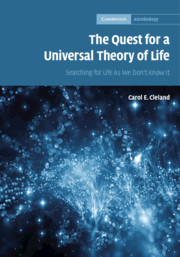Book contents
- The Quest for a Universal Theory of Life
- Reviews
- Cambridge Astrobiology
- The Quest for a Universal Theory of Life
- Copyright page
- Dedication
- Contents
- Acknowledgments
- Introduction
- 1 The Enduring Legacy of Aristotle: The Battle over Life as Self-Organization or (Genetic-Based) Reproduction
- 2 Why Life Cannot Be Defined
- 3 What Is a Scientific Theory?
- 4 How Scientific Theories Develop
- 5 Challenges for a Universal Theory of Life
- 6 Rethinking the Traditional Paradigm for Life: Lessons from the World of Microbes
- 7 Artificial Life: Could ALife Solve the N = 1N=1 Problem?
- 8 Searching for Extraterrestrial Life Without a Definition or Universal Theory of Life
- 9 A Shadow Biosphere: Alien Microbes on Earth?
- Conclusion
- References
- Index
1 - The Enduring Legacy of Aristotle: The Battle over Life as Self-Organization or (Genetic-Based) Reproduction
Published online by Cambridge University Press: 05 September 2019
- The Quest for a Universal Theory of Life
- Reviews
- Cambridge Astrobiology
- The Quest for a Universal Theory of Life
- Copyright page
- Dedication
- Contents
- Acknowledgments
- Introduction
- 1 The Enduring Legacy of Aristotle: The Battle over Life as Self-Organization or (Genetic-Based) Reproduction
- 2 Why Life Cannot Be Defined
- 3 What Is a Scientific Theory?
- 4 How Scientific Theories Develop
- 5 Challenges for a Universal Theory of Life
- 6 Rethinking the Traditional Paradigm for Life: Lessons from the World of Microbes
- 7 Artificial Life: Could ALife Solve the N = 1N=1 Problem?
- 8 Searching for Extraterrestrial Life Without a Definition or Universal Theory of Life
- 9 A Shadow Biosphere: Alien Microbes on Earth?
- Conclusion
- References
- Index
Summary
There are universal theories in physics and chemistry but no universal theories in biology. The failure of biologists to come up with such a theory is not due to a lack of effort. Philosophers and scientists have struggled to formulate universal principles of life since at least the time of Newton. This chapter traces the history of these efforts back to their roots in the work of the ancient Greek philosopher Aristotle. Aristotle’s influence can be seen today in the view, which dominates contemporary biological thought about the nature and origin(s) of life, that the following abstract functional characteristics are basic to life: (1) the capacity to self-organize and maintain self-organization for an extended period of time against both external and internal perturbations and (2) the capacity to reproduce and (in light of Darwin’s theory of evolution) transmit to progeny adaptive characteristics. For the sake of simplicity, I refer to the former as “O” and to the latter as “R” throughout this chapter. As Section 1.2 discusses, the conceptual parallels between O and R and Aristotle’s ideas about life are remarkably close. He identified “nutrition” and “reproduction” as the basic functions of life and debated (as do so many contemporary researchers) which is more basic. Aristotle also bequeathed to biology the thorny problem of teleology – the notion that the allegedly basic functions of life (in their contemporary guise, metabolism and genetic-based reproduction) require a strange (to the modern scientific mind) form of causation that is intrinsically directed at achieving a future goal. As Aristotle argued, living things are not just fed, they feed themselves, and they are not just copied, they reproduce themselves. Characteristic O reflects this view in explicitly referring to the idea of self-organization. Similarly, characteristic R implicitly assumes that organisms contain an internal principle for generating organisms resembling themselves; external processes do not (like a 3D printer) duplicate them.
- Type
- Chapter
- Information
- The Quest for a Universal Theory of LifeSearching for Life As We Don't Know It, pp. 8 - 32Publisher: Cambridge University PressPrint publication year: 2019



